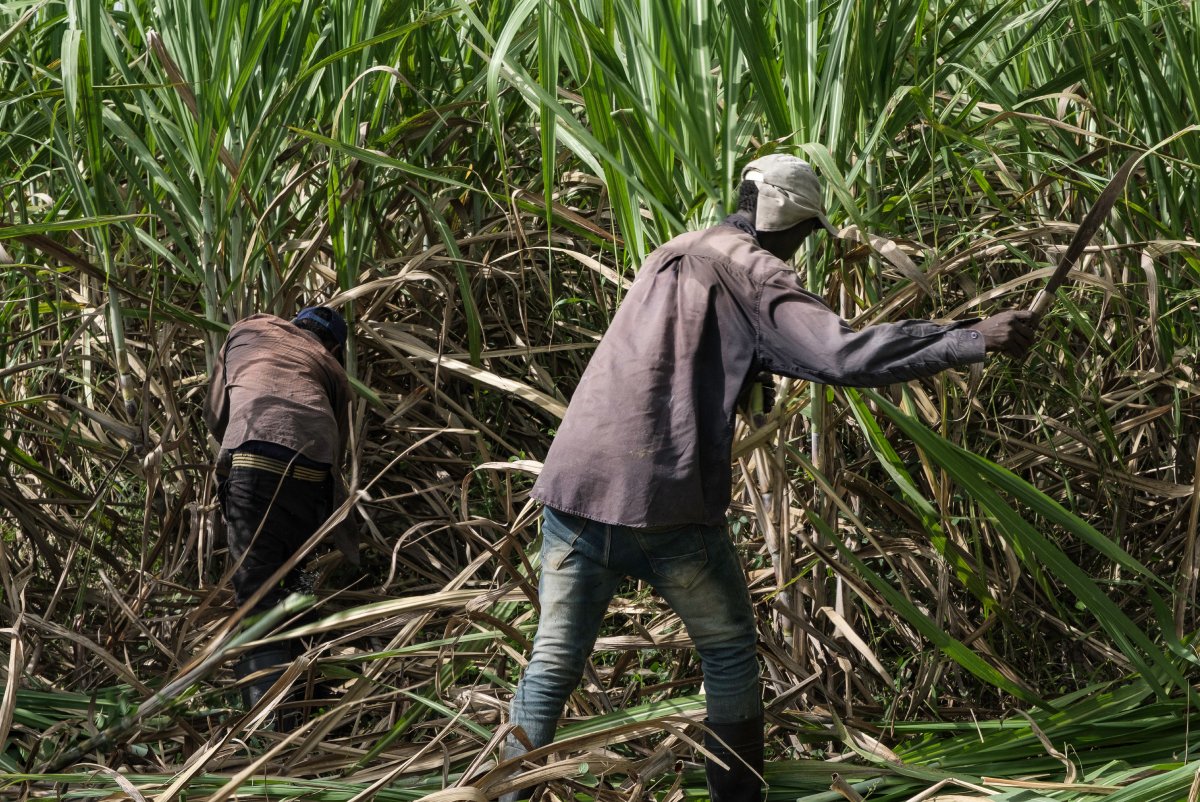
🧵Have you ever wondered where your sugar comes from?
Each year, Domino Sugar produces millions of pounds of refined sugar for candy makers and supermarkets. But if you look at their packaging, it doesn't say exactly where that processed sugar originates. bit.ly/reveal-sugar
Each year, Domino Sugar produces millions of pounds of refined sugar for candy makers and supermarkets. But if you look at their packaging, it doesn't say exactly where that processed sugar originates. bit.ly/reveal-sugar
2/ Some of it comes from cane grown in the United States. Brazil and Mexico are also big suppliers.
And then there's the Dominican Republic, where on vast plantations sugarcane is still cut by men with machetes and hauled away by ox-drawn carts. bit.ly/reveal-sugar
And then there's the Dominican Republic, where on vast plantations sugarcane is still cut by men with machetes and hauled away by ox-drawn carts. bit.ly/reveal-sugar

3/ The work is grueling and the conditions can be dangerous. For decades, much of this work has been done by Haitian migrants.
When @Sandy_Tolan started reporting on the Dominican Republic's sugar industry 30 years ago, the situation was a nightmare. bit.ly/reveal-sugar
When @Sandy_Tolan started reporting on the Dominican Republic's sugar industry 30 years ago, the situation was a nightmare. bit.ly/reveal-sugar

4/ @Sandy_Tolan met people forced to work on the sugar plantations who were guarded by men with shotguns and others who had been trafficked into the country via a human trafficking ring aided by the Dominican military.
There was even child labor. bit.ly/reveal-sugar
There was even child labor. bit.ly/reveal-sugar
5/ More recently, a 2013 report by the U.S. Department of Labor cited evidence of forced labor and child labor on sugar plantations in the Dominican Republic. bit.ly/3EClf3q 

6/ Over the years, the Dominican sugar industry and its biggest sugar company, Central Romana Corporation, have come under pressure from local activists, the United Nations and the Department of Labor to improve conditions.
Central Romana claims conditions have improved.
Central Romana claims conditions have improved.
7/ Yet, @Sandy_Tolan and Haitian-Dominican journalist @EuclidesNuel spoke to workers on the plantations who, despite getting government pension funds deducted from their paychecks, say they have no access to government pensions. bit.ly/reveal-sugar
8/ Then there are the wages.
On a good day, cutting 2,200 pounds of sugarcane gets workers "Julio and Cardenas" a little over $3 for their day's work. They're well past retirement age and have been doing this work for decades. bit.ly/reveal-sugar
On a good day, cutting 2,200 pounds of sugarcane gets workers "Julio and Cardenas" a little over $3 for their day's work. They're well past retirement age and have been doing this work for decades. bit.ly/reveal-sugar

9/ The cane cutters live in work camps, also known as bateyes, on the sugar plantations. The living conditions are harsh.
Flimsy wooden houses. Cracked, crumbling walls. Mattresses on bare floors. And darkness. An estimated 90% of bateyes have no electricity.
Flimsy wooden houses. Cracked, crumbling walls. Mattresses on bare floors. And darkness. An estimated 90% of bateyes have no electricity.

10/ In addition, many of the Haitian sugarcane workers are undocumented, and there has been no help from the Dominican government or their employer, Central Romana Corporation, to acquire legal papers.
It's left many workers trapped. bit.ly/reveal-sugar
It's left many workers trapped. bit.ly/reveal-sugar
11/ Who or what can improve conditions and the workers’ livelihoods? @Sandy_Tolan says Central Romana could just do it.
"Some of this is happening at other sugar companies. So we know it can be done." bit.ly/reveal-sugar
"Some of this is happening at other sugar companies. So we know it can be done." bit.ly/reveal-sugar
12/ For now, the workers only have themselves.
They are now protesting for simple things like the pensions they were promised, and better living conditions for their families.
🎧 Tune in to this week's Reveal for more on the bitter work behind sugar: bit.ly/reveal-sugar
They are now protesting for simple things like the pensions they were promised, and better living conditions for their families.
🎧 Tune in to this week's Reveal for more on the bitter work behind sugar: bit.ly/reveal-sugar
13/13 "If people could see at what price they put sugar in their coffee every morning, they would be absolutely horrified."
Dig deeper into @Sandy_Tolan and @EuclidesNuel's reporting at @MotherJones: motherjones.com/politics/2021/…
Dig deeper into @Sandy_Tolan and @EuclidesNuel's reporting at @MotherJones: motherjones.com/politics/2021/…
• • •
Missing some Tweet in this thread? You can try to
force a refresh






